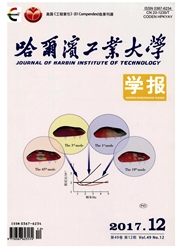

 中文摘要:
中文摘要:
为改善氨水卡林纳-朗肯循环组合系统的运行性能,选取动力回收效率和火用效率作为评价指标,对氨水卡林纳-朗肯循环组合系统进行研究.分析外界冷热源温度变化对系统动力回收效率和火用效率的影响规律,并且分析在一定初始条件下循环系统各个设备的火用损失和火用效率,有针对性地改善系统的传热性能.在热源进口温度为300℃,卡林纳循环和朗肯循环冷源进口温度分别为25℃和15℃时,卡林纳循环和氨水朗肯循环的动力回收效率分别为18.2%、14.6%,火用效率分别为41.1%、33.1%,而氨水朗肯循环的综合动力回收效率和综合火用效率可以达到19.6%和46.5%.当供暖水温度分别为70℃或90℃而回水温度保持40℃时,氨水朗肯循环可以获得55.3%或65.6%采暖回收率,8.7%或13.4%的热水火用效率.
 英文摘要:
英文摘要:
The thermodynamic analysis of the integrated system was conducted and the indexes of the power recovery efficiency and the exergy efficiency were chosen for system performance evaluation. The impact of inlet temperatures of both the heat resource and cooling water on the power recovery efficiency and the exergy efficiency of the system were analyzed under certain initial conditions. The exergy loss and exergy efficiency of each component of the system were demonstrated which could direct the improvement target of the system for better heat transfer performance. When the heat resource inlet temperature thl = 300℃, the power recovery efficiencies of the Kalina cycle ( cooling water tcl = 25℃ ) and Rankine cycle (tcl= 15 ℃) are respectively 18.2% and 14.6%, the exergy efficiencies are respectively 41.1% and 33.1%, while the composite power recovery efficiency and composite exergy efficiency of the ammonia-water Rankine cycle are respectively 19.6% and 46.5%. Moreover, when the temperature of heating water is set as 70 ℃ or 90 ℃, while the temperature of back water keeps 40℃, the Rankine cycle can get additional 55.3% or 65.6% heating recovery efficiency or 8.7% or 13.4% heating water exergy efficiency.
 同期刊论文项目
同期刊论文项目
 同项目期刊论文
同项目期刊论文
 Enhanced heat and mass transfer in alternating structure of tubes and longitudinal trough mesh packi
Enhanced heat and mass transfer in alternating structure of tubes and longitudinal trough mesh packi Flow and heat transfer performances of helical baffle heat exchangers with different baffle configur
Flow and heat transfer performances of helical baffle heat exchangers with different baffle configur Influence of baffle configurations on flow and heat transfer characteristics of trisection helical b
Influence of baffle configurations on flow and heat transfer characteristics of trisection helical b Power generation and heating performances of integrated system of ammonia–water Kalina–Rankine cycle
Power generation and heating performances of integrated system of ammonia–water Kalina–Rankine cycle Experimental investigation on performances of trisection helical baffled heat exchangers for oil/wat
Experimental investigation on performances of trisection helical baffled heat exchangers for oil/wat Numerical simulation of the heat transfer performance of trisection helical baffled electric heaters
Numerical simulation of the heat transfer performance of trisection helical baffled electric heaters Performance Comparison of Trisection Helical Baffle Heat Exchangers with Different Circumferential O
Performance Comparison of Trisection Helical Baffle Heat Exchangers with Different Circumferential O 期刊信息
期刊信息
